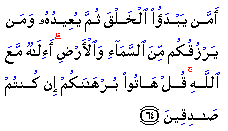Pagan Philosophy, Luxury and Privation, Checklist of Ramadan
Issue 296 » October 15, 2004 - Ramadan 1, 1425
General
| Living the Quran |
Al-Naml
(The Ants)
No such proof has been forthcoming. To deny the existence of God is a syndrome, not a philosophy or a science. It is a by-product of arrogance and fanciful theorization, and cannot be accredited with any logic or intellectual respectability. Contemporary scientific materialism is a rehash of ancient pagan philosophies. Its danger lies in the fact that it has come to be considered as science, purported to be based on evidence and tangible proof. This thinking is the underlying cause behind today's global malaise which is leading humanity to disaster. Muhammad was instructed to rebut such arguments and to bring people face to face with the reality of the hereafter. His mission was to give the world a civilization with a strong faith in God, built on authentic revelation, whose people are taught and prepared to face accountability in the hereafter. Islam has established a society whose laws, relationships and behaviour are shaped by the belief in the hereafter. It is not for nothing that Muslims stand up to face God in prayer five times a day every day of their lives. Source: |
| Understanding the Prophet's Life |
| Limits of Luxury and Privation If we go back to the first stage of Islam, we find a poverty-stricken country in which hardship and penury were common; it is for this reason that we find the Messenger saying, as he limits luxury, "No son of man has any claim to possess more than three things: the house in which he lives, the garment which covers his nakedness, and a crust of bread and water." Islam does not demand hardship so long as that hardship is not necessitated by the conditions of the environment or by the state of the community. It is true, nonetheless, that the wearing of silk and saffron-dyed clothes or of embroidered garments is harmful to the status of men; it encourages them to become soft and cowardly in time of war; and such softness cannot exist in a community where the economic level does not permit it. But, the Messenger did not carry the idea of hard living to the point of neglecting and overlooking one's dress. Jabir told this story of him. The Messenger of Allah came to visit us once, and seeing a dishevelled man with untidy hair, he said, "Could this fellow find nothing to keep his head in order?" Then, seeing a man wearing dirty clothes, he said, "Could this fellow find no way of washing his clothes?" In the same strain Abul al-Akwas al-Jashmi tells the story on the authority of his father: The Prophet once saw me wearing old clothes, and said, "Have you any property?" I said, "Yes." He asked, "Where did you get your property?" and I said, "From all that Allah has given me in the way of sheep and camels." He said, "Then, since Allah has given you property, let Him see you wearing some of the results of His favour and generosity." It is the general standard of living in the community that must be the limiting factor in both luxury and privation. For, when Allah granted to the Muslims the conquest of the neighbouring countries, when the general wealth increased and the standard of living rose, clothes became more elaborate, and the Muslims enjoyed things that they had never known before. Yet no one reproved them for such conduct so long as they did not exceed a reasonable limit. But, when there are millions who cannot afford the simplest dwelling, who in the twentieth century have to take tin cans and reed huts as their houses; when there are those who cannot even find rags to cover their bodies, it is an impossible luxury that a mosque should cost a hundred thousand guineas or that the Kaba should be covered with a velvet covering, embroidered with gold. And it makes no difference that it is the Kaba or that it is a mosque. For, people are more deserving of the money that is spent in this way. Source: |
| Blindspot |
A Quick Checklist Of Ramadan
Source: |
